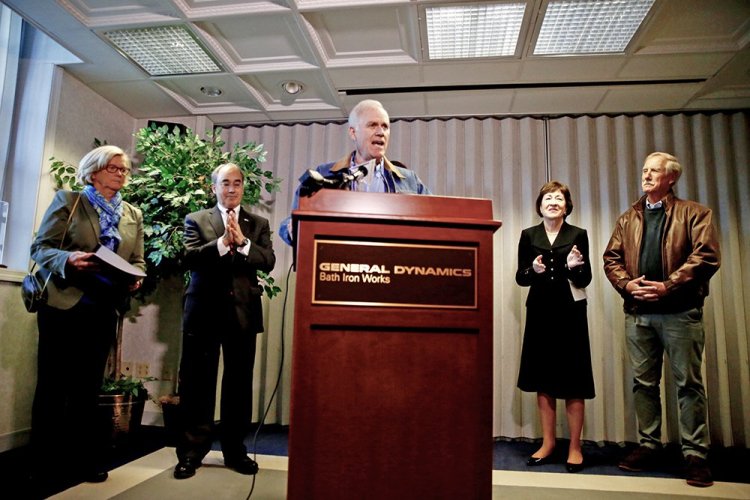BATH — The secretary of the Navy reaffirmed the federal government’s commitment to Bath Iron Works on Friday and said the military must work with shipyards to expand capacity as the Navy seeks to grow its fleet.
“We have great faith in Bath – Bath built, best built – and we look forward to this relationship growing and even becoming stronger from a base that is historically monumental,” Navy Secretary Richard Spencer said.
Spencer toured BIW for the first time Friday, one day after the Navy announced contracts for two additional destroyers at the shipyard. The contracts provide funding for the fifth Arleigh Burke-class destroyer as part of a five-ship contract awarded to BIW in 2013, as well as for a sixth ship negotiated by the Navy, BIW parent company General Dynamics and Maine’s congressional delegation.
Speaking with reporters before his tour, Spencer said the Navy “definitely” needs a larger fleet given the threats facing the nation and the importance of having ships deployed around the globe. With their powerful radar and armament systems, Arleigh Burke-class destroyers provide both offensive capabilities but can also track and destroy short- to intermediate-range ballistic missiles.
“We are not at war because that is a technical (decision) that Congress has to demand, but I will tell you that we are in combat around the globe,” Spencer said. “Our uniformed service members and their civilian teammates are fighting on many fronts. These threats, we don’t see them diminishing in any way. The Navy-Marine Corps team needs to have these platforms prepared for power projection.”
The Navy and Trump administration have called for building toward a 355-ship fleet, up from fewer than 300 ships today. Such an expansion would be costly, however. A recent analysis by the nonpartisan Congressional Research Service estimated that a 350-ship Navy would require $3.5 billion to $4 billion in additional funding every year over the 30-year build-out period.
BIW and its competitor shipyard for building Navy destroyers, Huntington Ingalls in Mississippi, are both under intense pressure to hold down costs on Arleigh Burke destroyers that each carry a cost estimated at $1.8 billion. But Spencer said the Navy has a responsibility “to work with our suppliers as a partnership” to reduce costs and ensure the industrial base has the capacity to build more ships.
There are currently six destroyers at various stages of construction in Bath – four Arleigh Burke-class ships and two Zumwalt-class stealth destroyers.
“This is where we are going to be working alongside Bath and General Dynamics … to see how, in fact, we grow going forward,” Spencer said. “We can’t simply sit here and mandate, ‘We want ships built.’ We have to understand what the actual industrial base can support and where capacity is. Where we can help to expand capacity in lockstep with our suppliers, our contractors, we will do so.”
Two destroyers built at BIW, the USS Fitzgerald and the USS John S. McCain, were recently involved in collisions that killed 17 sailors. The incidents prompted a systemwide review of culture, training and maintenance in a Navy fleet that experts say is increasingly stretched thin. Spencer said reviews of those incidents are ongoing but that the Navy also is reaching out to the maritime community and private companies for ideas on improving safety.
The Navy awarded the contract to repair the Fitzgerald to BIW’s competitor, Huntington Ingalls, a decision that disappointed BIW officials and members of Maine’s congressional delegation. Spencer said the Navy is still analyzing where to repair the McCain, which sustained less damage than the Fitzgerald.
“We have not come to a conclusion,” Spencer said. “The primary driver though is how can we get it back into the fleet as soon as possible. This is a critical part of the ballistic missile defense system.”
With roughly 6,000 workers, BIW is one of Maine’s largest private employers and is one of two shipyards that build the guided-missile destroyers that are considered the “workhorses” of the Navy fleet. Spencer addressed members of BIW’s workforce later Friday.
All four members of Maine’s congressional delegation – Sens. Susan Collins and Angus King and Reps. Chellie Pingree and Bruce Poliquin – joined Spencer at BIW on Friday along with BIW President Dirk Lesko. The delegation members each worked on different aspects of securing authorization or funding for the two additional destroyer awards announced Thursday and thanked Spencer for his personal commitment to finalizing the two contracts.
“That demonstrates the Navy’s commitment to BIW and its confidence in its highly skilled workforce,” said Collins, a Republican member of the Senate Appropriations Defense Subcommittee that earmarks money for shipbuilding. “You noticed that the secretary already knows that ‘Bath built is best built.’ The contracts will help to strengthen our fleet and allow the Navy to promote civility and security in the face of proliferating threats around the globe.”
King, an independent who serves on the Senate Armed Services Committee, told Spencer that he is always welcome to visit Bath.
“And now that you’ve established the precedent, bring a couple of destroyers with you,” King said. “We’d love to have you.”
Kevin Miller can be contacted at 791-6312 or at:
Twitter: KevinMillerPPH
Send questions/comments to the editors.




Comments are no longer available on this story